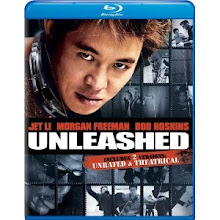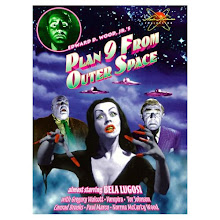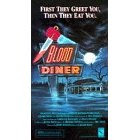by Jason Pyles
“Yes, the devil is in your hands, and I will suck it out.
Now, I will not cast this ghost out with a fever, for the new spirit inside me has shown me I have a new way to communicate: It is a gentle whisper …
Get out of here, ghost. Get out of here, ghost. Get out. Get out of here, ghost.
Get out of here, ghost. Get out of here, ghost. Get out of here.
Don’t you dare turn around and come back — for if you do, all of the armies of my boot will kick you in the teeth, and you will be cast up and thrown in the dark and thrashed back to perdition.
And as long as I have teeth, I will bite you. And if I have no teeth, I will gum you. And as long as I have fists, I will bash you — now get out of here, ghost. Get out!” --- Eli Sunday
I love watching loose-cannon characters in the cinema. You just never know what they’ll do next — and when they do it, we’re always shocked, but not surprised. Daniel Plainview is one such example. A better example of a true loose cannon, however, is Joe Pesci in “Goodfellas” (1990).
I acknowledge the well-known fact that “There Will Be Blood” is an adaption of Upton Sinclair’s 1927 “Oil!” novel, but Plainview should have been a “looser cannon,” more like Pesci.
I know, I know — review the movie they made, not the one they didn’t make — but this observation correlates directly with the film’s foremost flaw. Here is the problem:
Plainview is a character who is overcome by his passion and obsession of being “an oil man.” Indeed, his preoccupation with his career leads him to madness by a flaxen cord. As we watch this man quickly slip off the deep end, we get the sinking feeling that his acts will escalate. And they do. But Plainview’s insanity should have been physically manifested exponentially, because he becomes exponentially crazier than when the movie begins in 1898.
In other words, he should have really gotten nuts, like Joe Pesci’s Tommy DeVito character in “Goodfellas” does. If the character would have blown himself up (figuratively not literally), then the movie would have actually gone somewhere and we wouldn’t be left with this unsatisfying ending.
Yes, one could argue, that the ending reflects the empty, miserable dissatisfaction that Plainview had with his own life. Perhaps. But the concluding line “I am finished,” then a black screen just doesn’t do it. “No Country for Old Men” (2007) does a similar thing. Both films are adaptations. Both films were nominated for Best Picture last year. The latter won.
This sans-closure ending is a novel trend (double entendre), hip to the 2000s. I guess, of late, we tend to regard the tidy, convenient happily-ever-after endings as a decades-old, clichéd convention, which they are. No, life usually doesn’t unfold that way. And that’s fine, but “There Will Be Blood” begins with such promise, it needs to keep that promise. I was enthralled by the painful and dangerous depictions of the first 20 minutes. I was hooked. But then the movie meanders out of focus into insignificance. It doesn’t escalate as it should; instead, it peters out.
But still, I very much admire “There Will Be Blood.” In fact, I am often impressed with Paul Thomas Anderson’s films. His “Punch Drunk Love” (2002) was just about perfect, almost a pure masterpiece. Unfortunately, I find myself at a loss for words on how to accurately describe why I admire Anderson’s movies, such as “Punch Drunk Love” and “There Will Be Blood.”
Call it simple-minded, but I am a sucker for a movie that convinces me that its world is real. If a movie is realistic, it’s already half won me over. And high praise belongs to Daniel Day-Lewis and Paul Dano for their performances. I appreciated those two counterpoint characters. I love how, on the surface, they seemed to represent clear-cut, black-and-white, good and evil. But neither was a likable or admirable or good character. In fact, I found the zealot preacher Eli Sunday pretty much despicable. Usually, I was rooting for the oil man. Also, I loved the ominous, uneasy soundtrack. It heightens the dread of the loose cannon.
It’s a well made film, no doubt, but “There Will Be Blood” is like an unfinished railroad track: It doesn’t go anywhere.
Tuesday, September 23, 2008
Subscribe to:
Post Comments (Atom)






























































1 comment:
Holy crap, jason! Nice analysis! I wish I had time to jump in share my thoughts every week, but my senior semester is proving to be a little more busy than I expected it to be.
I, too, am a fan of There Will Be Blood. I liked it the first time I saw it, and LOVED it every viewing after. What a character analysis. You watch the two most prideful people on the most opposite ends of the spectrum and the sparks and fireworks that ensue. You see pride literally kill people and destroy the only wholesome things in theirs lives. Absolutely brilliant.
Post a Comment